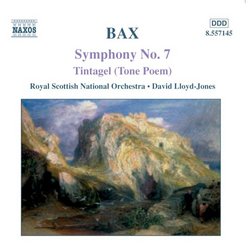Epilogue
Joshua Grasso | Oxford, OH USA | 01/19/2004
(5 out of 5 stars)
"Another astounding release in Naxos' Bax Cycle. If you aren't familiar with Bax's music (which is certainly easy enough), this is a great place to start. For one, it contains perhaps his greatest--or at least, most universally appealing--orchestral work, Tintagel. This is a luminously scored Romantic work, with big themes and a "legendary" atmosphere--something that could accompany the great Medieval epics, or perhaps even The Lord of the Rings. A piece that only grows with repeated listenings.Symphony No.7, which I'm only just becoming acquainted with, seems unique in Bax's output. His last symphony is somewhere between a summing up and a new departure. Compared to the majority of his symphonies (especially Nos.2, 4 & 6), this is a much more amiable piece, gently romantic, and at times even playful. It has a languid atmosphere, which is often interrupted by the more virile Bax (as in the opening of the finale). But this is gorgeous music of a high caliber; the slow movement, in particular, is haunting stuff. I can't help but see this work as self consciously autumnal, the work of a man who knew his best days were past, but still had enough strength to record his final thoughts before sliding comfortably into oblivion. I recommend starting with No.7, and working backwards, to see the hints and ideas that come together in this miraculous score. As always, David Lloyd-Jones and the Royal Scottish National Orchestra play beautifully--this is as fine a recording of Bax as you're likely to find. Everything "sounds" and nothing is lost in the shadows. If you start here, I would strongly recommend the entire cycle, perhaps continuing with No.2, 4 and 6, and then branching out into Nos.1,3,5, and the chamber works. Despite his relative neglect, there are no second-rate pieces here; it's more a matter of understanding Bax's idiom and voice. Enjoy!"
SPLENDID!
J Scott Morrison | Middlebury VT, USA | 12/14/2003
(5 out of 5 stars)
"I have to confess that for many years I was not a big fan of Bax's music, but through my own ignorance, I fear. I was first exposed to his music through an ancient LP of piano music. I felt that both the music and the performance were utterly undistinguished. So I struck Bax off my list of composers to get to know. That turned out, of course, to be my loss. But on the positive side it has meant that he has been a later discovery, and for someone like I who for fifty years and more was always looking for new music to discover that has been a belated blessing. I've treasured the earlier issues of Bax orchestral music on Naxos, and my guess would be that this is the last of the series. Or at least it's the last of the symphonies to be recorded by them. Coupled with the Seventh Symphony, though, is Bax's most famous orchestral piece, 'Tintagel.' It is a symphonic poem that was inspired by a six-week sojourn in the area of Tintagel, on the northern Cornish coast. Tintagel sits on a high cliff overlooking the distant Atlantic, and the tone poem is really more about the sea than about the castle or the landscape. Indeed, it is Bax's 'La Mer.' David Lloyd Jones leads the Royal Scottish National Orchestra in a rich full-throated performance of this alternately romantically lyrical and tempestuous piece. It certainly stands among the best versions I've ever heard.Bax's final essay in symphonic form, the Seventh Symphony, in three movements like all Bax's symphonies, was premièred in 1939 by the New York Philharmonic-Symphony Orchestra (as it was then called) under the direction of the Bax enthusiast Sir Adrian Boult. The opening Allegro is a buoyant, even playful, piece interrupted by a lyrically melancholy section; one wonders if this latter is in any way inspired by the war clouds then massing in Europe. The slow movement begins with a slow, lazy, richly harmonized opening featuring languorous oboe/English horn solos and eventually supplanted by a somewhat more vigorous middle section subtitled 'In a Legendary Mood.' There is a vigorous climax before the music settles back into the opening dreamlike mood. The final movement is a theme-and-variations based on a solemn theme stated, after a stirring fanfare introduction, in the low strings and then taken through changing moods and tempi, becoming more and more agitated (but with some lyrical episodes and even some comic relief along the way) before a subdued, one might even say resigned, conclusion.After the Seventh Symphony (and the start in earnest of World War II) Bax lapsed into a several years' silence before being named Master of the King's Music. He never composed anything very significant afterwards.These performances are fully the equal of the earlier releases in this Naxos series. You really cannot do better than that.Scott Morrison"
King Arthur Comes Alive
Cynthia L. Sowden | Minneapolis, MN USA | 04/02/2007
(5 out of 5 stars)
"If you've ever stood on the Cornish coast and looked down at the waves beating on the rocks, you'll be there once again when you hear Bax's "Tintagel." This luscious tone poem deserves to be heard again and again."


 Track Listings (4) - Disc #1
Track Listings (4) - Disc #1